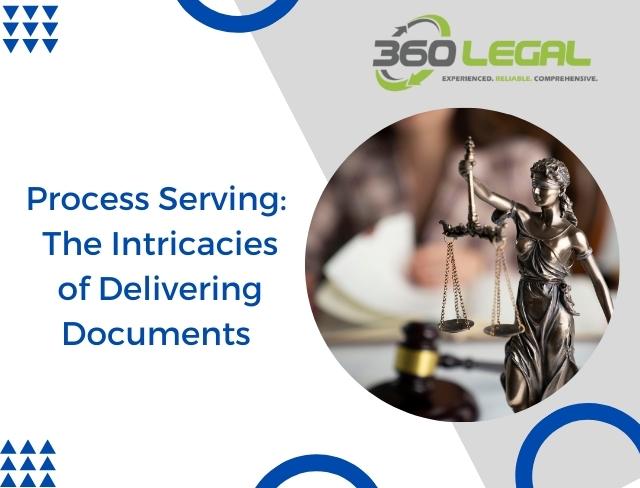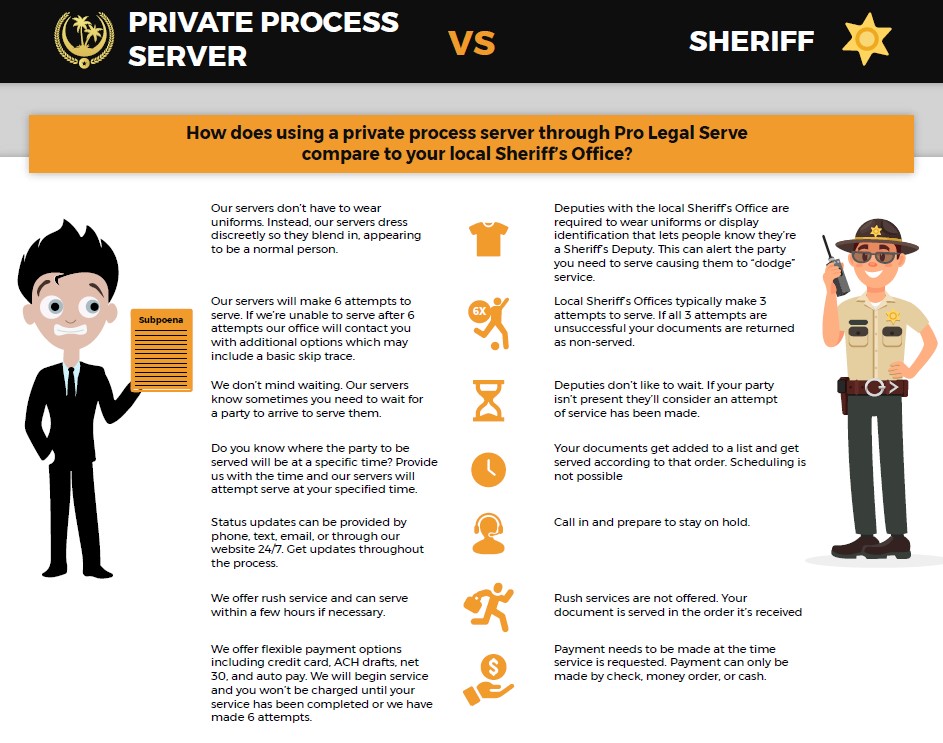Comprehending the Importance of Refine Serving in Lawful Procedures
Process serving is a fundamental element of lawful treatments that ensures all parties are educated of their commitments and civil liberties. By assisting in the official distribution of essential legal records, it promotes the principles of due procedure and adds to the stability of the judicial system. Nonetheless, the subtleties of efficient process offering expand beyond plain shipment; they incorporate legal demands and possible repercussions of inappropriate solution. Recognizing these details can substantially affect the results of legal disputes, motivating a better exam of the techniques that underpin this crucial function.
Definition of Process Serving
Refine offering is a critical element of the legal system, specified as the formal distribution of lawful files to people entailed in a lawsuit. This process guarantees that all celebrations are appropriately educated of legal activities being taken versus them or to which they are a celebration. Typically, these records include summons, issues, subpoenas, and various other court-related papers that call for the recipient's interest and action.
The significance of process serving hinge on its duty in promoting the concepts of due procedure. It assures that people have notice of legal process, consequently giving them an opportunity to react or protect themselves. Appropriate solution of process is not just a step-by-step rule; it is a basic facet of guaranteeing justness and transparency in the judicial system.
Refine serving can be conducted by various individuals, including professional procedure servers, police policemans, or even attorneys, depending on jurisdictional regulations. Each method of service has its very own requirements and techniques, which are vital to stop hold-ups or dismissals within the lawful framework. Comprehending the interpretation and feature of process serving is vital for all stakeholders involved in lawful process.

Legal Demands for Process Offering
Lawful needs for procedure serving are important to make certain that the shipment of legal papers sticks to established protocols and is acknowledged by the court. Each territory has details regulations controling exactly how and when records have to be offered, which may include subpoenas, issues, and summonses.
Usually, process-server must be unbiased third celebrations that are not associated with the case. They should also abide with state guidelines relating to service techniques, which can consist of personal solution, alternative service, or service by mail. Personal service entails supplying files straight to the recipient, while alternative solution enables delivery to another responsible individual at the recipient's house or business.
Furthermore, procedure servers are typically called for to file a proof of service, a lawful paper that validates the distribution of papers, with the court. This file consists of information such as the day, time, and method of solution, along with the name of the individual served.

Duty in the Justice System
An important element of the justice system, process offering guarantees that individuals associated with legal proceedings are appropriately notified of activities taken against them (Process Serving). This formal notification is critical for maintaining the concepts of due process, which mandates that events have the possibility to respond to claims made versus them. Without reliable procedure serving, the lawful system would certainly be rendered inefficient, as individuals can participate in actions without understanding of pending legal issues
Process-server serve a vital function in securing the stability of the lawful process. They serve as neutral events, providing lawful records such as summons, complaints, and subpoenas, therefore fostering transparency and liability within the judicial framework. By making certain that all parties are educated, process offering assists to avoid any prospective unjust advantage, enabling fair participation in lawful procedures.
Furthermore, the professionalism and trust of process servers adds to the general public's rely on the justice system. Their adherence to moral techniques and lawful criteria enhances the authenticity of the judicial procedure. Inevitably, efficient process serving is essential in promoting the guideline of law view and making certain that justice is accessible to all people associated with lawful disagreements.
Effects of Improper Solution
The consequences of improper solution can dramatically weaken the integrity of lawful process. Inappropriate service can result in the offender not being aware of the lawful action versus them, which might prevent them from responding properly or presenting their protection.
Moreover, incorrect solution can provide court orders and judgments invalid, forcing the complainant to reactivate the process, which can be both financially burdensome and taxing. It can likewise open up the door to difficulties and appeals, as the offender might say that they were not effectively notified of the proceedings, complicating the legal landscape better.
Best Practices for Effective Service

2nd, timing plays a crucial role. Offering papers promptly can stop delays in legal procedures and make certain that all celebrations are alerted in a prompt way. Furthermore, employing an expert process-server can boost efficiency, as they are educated to navigate possible challenges and ensure conformity with regional regulations.
Third, keeping accurate records of the service process is critical. Recording the day, time, and fashion of service can offer crucial proof if disputes develop regarding whether service was properly executed.
Conclusion
To conclude, procedure offering is a vital part of legal procedures, making sure that all events are duly alerted and afforded the chance to respond. Following lawful demands and ideal practices not just supports the principles of due procedure yet also enhances the integrity of the justice system. The consequences of incorrect service can result in considerable hold-ups and difficulties, highlighting the necessity for efficient procedure serving in promoting fairness and access in lawful disputes.
The subtleties you can try this out of reliable process serving expand past simple delivery; they encompass lawful needs and potential repercussions of inappropriate service.Refine offering is an important component of the lawful system, specified as the official distribution of lawful records to people involved in a court case. Without efficient process offering, the lawful system would be provided inadequate, as individuals can engage in activities without understanding of pending lawful matters.
Process servers serve an essential function in protecting the honesty of the lawful process - Process Serving. The repercussions of incorrect solution can lead to considerable hold-ups and problems, highlighting the requirement for reliable process offering in advertising justness and ease of access in lawful conflicts